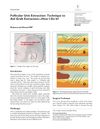47 citations,
January 2003 in “Current opinion in urology” A new drug, dutasteride, is at least as effective as the older drug, finasteride, for treating enlarged prostate and may have additional uses.
 August 2023 in “Scientia Pharmaceutica”
August 2023 in “Scientia Pharmaceutica” Color changes in Minoxidil hair products do not affect their effectiveness.
 33 citations,
October 2017 in “Drug Safety”
33 citations,
October 2017 in “Drug Safety” SJS/TEN survivors often have severe, overlooked long-term physical problems that are not properly treated after leaving the hospital.
 1 citations,
November 2023 in “Brain and behavior”
1 citations,
November 2023 in “Brain and behavior” Spironolactone improved cognitive performance and early sleep quality but not manic symptoms, appetite, or body weight in bipolar disorder when added to sodium valproate.
 105 citations,
September 1995 in “Journal of The American Academy of Dermatology”
105 citations,
September 1995 in “Journal of The American Academy of Dermatology” Recombinant cytokine therapy can cause skin reactions ranging from mild to severe.
3 citations,
January 2023 in “Nutrients” Hordenine may help hair grow by activating a specific cell growth pathway.
 6 citations,
October 2012 in “BMJ”
6 citations,
October 2012 in “BMJ” The woman's hair loss was mainly due to stress and low iron levels, and her hair grew back after treatment.
 48 citations,
November 1992 in “International Journal of Dermatology”
48 citations,
November 1992 in “International Journal of Dermatology” Toxic epidermal necrolysis is a severe skin reaction often linked to drugs, requiring careful medication use and supportive care.
 6 citations,
September 2017 in “The American Journal of Cosmetic Surgery”
6 citations,
September 2017 in “The American Journal of Cosmetic Surgery” Dr. Muhammad Ahmad's technique improves hair transplant success by increasing space between hairs and adjusting their angle to reduce damage and skin removal during extraction.
 25 citations,
July 1991 in “International Journal of Dermatology”
25 citations,
July 1991 in “International Journal of Dermatology” Toxic Epidermal Necrolysis is a rare, serious skin condition that can affect anyone, is more common in women, and may be linked to genetics, with a 20% mortality rate mainly due to sepsis.
 6 citations,
March 1990 in “Archives of Dermatology”
6 citations,
March 1990 in “Archives of Dermatology” Sam Shuster identified three types of hair loss in psoriasis and emphasized the need for better research to understand them.
 January 1989 in “Side effects of drugs annual”
January 1989 in “Side effects of drugs annual” Some cancer and immune system drugs can cause serious side effects, including heart, lung, nerve, and organ damage, which need careful monitoring and management.
 January 2012 in “Springer eBooks”
January 2012 in “Springer eBooks” Lupus can cause different skin problems, and treatments like quitting smoking and using certain creams or medicines can help.
 3 citations,
February 2008 in “Basic and clinical dermatology”
3 citations,
February 2008 in “Basic and clinical dermatology” Telogen Effluvium is a hair loss condition where treatment involves identifying and managing its triggers.
 January 1982 in “Side effects of drugs annual”
January 1982 in “Side effects of drugs annual” High doses of certain vitamins can cause serious side effects and health risks.
 April 2023 in “Journal of Investigative Dermatology”
April 2023 in “Journal of Investigative Dermatology” Two new IRAK4-inhibitors effectively reduced skin inflammation and immune response markers in healthy volunteers.
 32 citations,
December 1969 in “The Lancet”
32 citations,
December 1969 in “The Lancet” Children with marasmus have more resting hair follicles and thinner, less pigmented hair, showing long-term malnutrition.
30 citations,
June 1993 in “The Journal of Cell Biology” The oncoprotein causes abnormal hair growth without increasing skin cancer risk.
April 2024 in “Molecules/Molecules online/Molecules annual” The composite sponge helps heal diabetic wounds by reducing inflammation and promoting new blood vessel growth.
 December 2013 in “Nursing2023”
December 2013 in “Nursing2023” The FDA approved a new breast cancer treatment, found flu shots may reduce heart risks, questioned the safety of fast-tracked drug approvals, showed statins don't help with certain pneumonia, and approved a new dementia imaging agent.
September 2013 in “International journal of radiation oncology, biology, physics” High dose rate electronic brachytherapy is an effective and safe non-surgical treatment for nonmelanoma skin cancer with good cosmetic results after three years.
 October 2023 in “CHEST Journal”
October 2023 in “CHEST Journal” Early recognition and treatment of severe SLE symptoms can improve outcomes.
 79 citations,
January 1982 in “The American Journal of Medicine”
79 citations,
January 1982 in “The American Journal of Medicine” Etoposide is effective in treating several cancers, especially small cell lung cancer, with acceptable side effects.
2 citations,
May 2016 in “Oxford University Press eBooks” Systemic lupus erythematosus is managed with lifestyle changes, symptomatic treatments, and careful use of medications to control symptoms and flares.
 September 2022 in “JAAD case reports”
September 2022 in “JAAD case reports” The man has a genetic skin condition called pachyonychia congenita.
 1 citations,
June 2007 in “Journal of Oral and Maxillofacial Surgery”
1 citations,
June 2007 in “Journal of Oral and Maxillofacial Surgery” A woman experienced temporary hair loss after jaw surgery due to the stress of the operation.
 3 citations,
June 2007 in “Journal of Cosmetic Dermatology”
3 citations,
June 2007 in “Journal of Cosmetic Dermatology” Using the right hair care products can improve hair health and help manage hair disorders.
6 citations,
May 2023 in “International journal of molecular sciences” Collagen-enhanced mesenchymal stem cells significantly improve skin wound healing.
39 citations,
September 2015 in “Clinical Therapeutics” Teriflunomide effectively reduces relapse rates and disease progression in multiple sclerosis but is not safe for use during pregnancy.
 December 2006 in “International Journal of Dermatology”
December 2006 in “International Journal of Dermatology” Mnemonics with one letter are useful and easy to remember for learning dermatology.





















